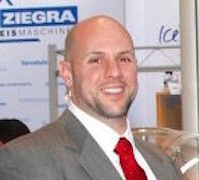
Food Industry Executive spoke with members of the Food Processing Suppliers Association’s (FPSA) Young Professionals Group about the challenges and opportunities they see in the food industry today and in the future. This interview is with Jacob Yates, a national sales manager for Poly-clip System, a company that makes clip closure packaging systems for the meat industry.
How did you get into the food industry?
I grew up on a family farm, and agriculture has always been a part of my life. I worked in the Iowa State Meat Lab while I was in school and found meat science as an option during this time.
I’ve been working in the industry since 2004, and I’ve been with Poly-clip for almost 8 years. I managed a territory for six years, and, since last year, I’ve been handling national accounts.
What do you like most about the food industry?
It’s a big industry, but it’s also very small. I service a lot of people — everybody has to eat, right? We can help and influence a lot of people, but at the same time, it feels small. Everybody knows everybody, and it’s a very tight-knit industry.
How would you like to see the food industry change?
It’s not a very diverse industry. More diversity and ideas are beneficial for any industry. To encourage diversity, the industry needs to work on getting more exposure. On the other side, it’s going to take people with more open minds to allow diversity into the industry as well.
What are your biggest challenges as a young professional in the food industry?
Trying to overcome the hurdles of old relationships that are still out there. There are people who have been in the industry for a long time, and they have 20- or 30-year relationships that are hard to get around as a younger person.
It’s tough to get people to understand that things are moving in a certain direction, and they need to adapt and change or you’ll get left behind. Those are the biggest hurdles in my opinion.
How do you overcome these hurdles?
Every time you show up to a meeting, bring some kind of value to the table. It can be small, but bring something to the table every time you show up to a group or meeting to help validate why you’re there. Show that you have ideas.
How can the industry reach out to younger people?
Part of the misconception is that if you go to school for meat or food science, you’ll either work in an R&D lab developing new products or you’ll go into the USDA side of things. I don’t think people realize how many different opportunities there are within the food and meat industry. People forget about the supply side — the equipment side — and some of the other sectors. We need to promote that and make it hip and cool.
On the supply side, I think there are some companies that are starting to adopt some of these ideas and concepts. It takes somebody running a company with an open mindset. We don’t have to do an 8-to-5 job. There’s a job to be done, and however you can get it done, that’s the goal.
Our company is more modern than many that still have the old school mentality, and that’s why I enjoy being where I am.
What advice do you have for companies who want to bring Millennials into the industry?
Be open minded, collaborate, and see the best of both ways of thinking. You’ll get better results by working together. Also, the younger generation doesn’t like to be micro-managed. Some companies have taken the approach of trust and letting workers do their job.
It falls back on the leadership of the company to show interest in the younger generation. They have to have an open mindset and move forward with the times with new ideas and concepts.
Personally, being more involved in organizations like FPSA and the Young Professionals Group has helped.
What advice do you have for a younger person looking to enter the food industry?
A lot of the older generation thinks the younger generation doesn’t know how to work. I don’t agree. I think it’s a different kind of work, a different style. You have to get past the perception that Millennials don’t know how to work or that they have no drive. Bring that work ethic and work hard, even if you’re not doing things the same way another generation would. Eventually it will be recognized and appreciated.
What broader trends will affect the industry in the next 5 to 10 years?
The way people communicate, the technology, the training — everything from fax to text and IM, how data is collected, how suppliers can talk to their customers, how equipment talks to each other. It just keeps evolving. Someone is always looking for that next step of communication and instant results and instant data.
The industry will also continue to become more global. I don’t see it going backwards.
Thank you, Jacob.
The FPSA Young Professionals Group is open to all FPSA members 35 years and younger. If you’d like to see what it’s all about, join the Slack channel.







